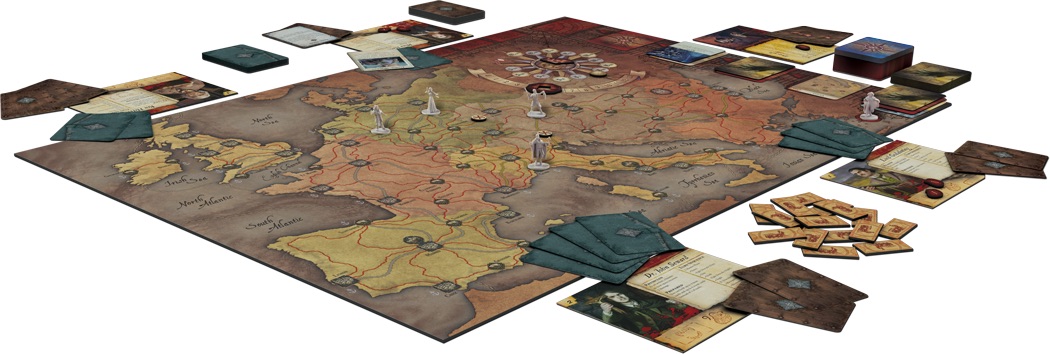How Fantasy Board Games Mix Strategy and Storytelling
Fantasy board games have become a unique blend of

Fantasy board games have become a unique blend of strategy and storytelling. They offer a perfect escape for players who enjoy adventure and decision-making. Combining imaginative worlds with tactical gameplay has made these games a favorite for many. Take a quick break and check out the EPL Predictions at 22Bet and hope you’ll place some winning bets.
The Rise of Fantasy Board Games
Fantasy board games are winning the hearts of players everywhere. Their rise in popularity reflects a shift in what people want from games. Simple mechanics are no longer enough. Players now crave deeper, more immersive experiences.
Roots in Role-Playing Classics
Fantasy board games began with role-playing games like Dungeons & Dragons. These games were the first to add storytelling to how we play. Instead of just winning or losing, players were part of epic adventures.
Modern fantasy board games build on this legacy. They’ve taken the storytelling element and combined it with new mechanics. The result? Games that are intricate, engaging, and full of possibilities.
Why Players Love Fantasy Board Games
Several factors contribute to their widespread appeal:
Immersive worlds
- Players explore magical realms filled with rich details.
- The artwork and themes make the experience unforgettable.
Creative storytelling
- Games like Gloomhaven offer evolving narratives that change with each session.
- Choices and actions directly shape the storyline.
Challenging strategies
- Success requires tactical thinking and planning.
- Resource management and teamwork add to the complexity.
From Traditional to Modern Fantasy Games
Traditional board games focused on simplicity. Players rolled dice, moved pieces, and competed for a clear goal. While fun, they lacked depth.
What Sets Fantasy Board Games Apart
Narrative-driven gameplay
- Fantasy games don’t just tell stories—they let players experience them.
- Games like Arkham Horror put players in suspenseful, evolving scenarios.
Complex mechanics
- Modern games include intricate rules and strategic elements.
- Players must think ahead, adapt, and work with others to win.
This evolution has created standout games such as:
- Gloomhaven: Known for its deep storylines and strategic challenges.
- Mage Knight: Combines exploration with tactical combat.
- Arkham Horror: Offers a thrilling mix of mystery and adventure.
Strategy Meets Storytelling
Fantasy board games seamlessly combine strategy with narrative. Players don’t just follow a script. They make choices that affect the story and gameplay.
For example, in Gloomhaven, players must strategize every move. The decisions they make impact the unfolding story. Whether to battle or retreat can change the game’s direction.
In contrast, some games, like Talisman, rely more on luck. However, the choices players make still shape their personal journey.
The Role of Strategy
Strategy is at the heart of these games. Players must think ahead, manage resources, and plan their moves. Fantasy board games challenge players in various ways:
- Tactical combat: Deciding how to defeat enemies.
- Resource management: Balancing gold, potions, or magic.
- Working with other players as a team helps you win.
The Power of Storytelling
Storytelling gives these games their soul. A strong narrative makes every choice feel meaningful. Players don’t just move pieces—they shape how the story ends.
Games like Arkham Horror and The Lord of the Rings: Journeys in Middle-Earth make storytelling fun. They take players on exciting adventures with surprises and twists. The stories change each time, so no two games are the same.
How Fantasy Games Create Immersion
Immersion is key in fantasy board games. Designers use creative tools to pull players into the game world.
Key Elements That Build Immersion
- Beautiful artwork: Maps, cards, and tokens are designed to transport players to another world.
- Rich characters: Players take on roles with unique abilities and backstories.
- Evolving gameplay: Stories progress as players achieve goals.
This mix makes players feel deeply connected to the game.
Cooperative vs. Competitive Play
Fantasy board games often offer two types of play: cooperative and competitive. Each brings its own excitement.
- Cooperative games: Players work together to achieve a common goal. Games like Pandemic: Legacy or Gloomhaven thrive on teamwork.
- Competitive games: Players battle against each other to win. These games test both strategy and creativity.
Both styles add to the storytelling. The group dynamics, whether as allies or rivals, create memorable experiences.
Popular Fantasy Board Games
Several fantasy board games have become staples for fans of the genre.
- Gloomhaven: Known for its deep story and strategic gameplay.
- Talisman: A classic that mixes adventure with luck.
- Arkham Horror: Perfect for those who love mystery and suspense.
- Mage Knight: A complex game that combines exploration with tactical combat.
Why Fantasy Board Games Are Here to Stay
The mix of strategy and storytelling makes these games timeless. They appeal to players who want more than just a game—they want an experience.
The creativity in this genre shows no signs of slowing down. Designers continue to innovate, blending technology and traditional gameplay. Digital integrations, like companion apps, enhance storytelling further.
The Future of Fantasy Board Games
Fantasy board games are already pushing boundaries. As technology moves forward, these games are getting better. The mix of tech and creativity will make the gaming experience even more exciting and real.
How Technology Will Transform Fantasy Board Games
Interactive storytelling
- Apps will play a bigger role in shaping narratives.
- Stories will adjust in real-time based on players’ decisions.
This makes every game session feel fresh and unique.
Augmented reality (AR)
- AR technology will bring game pieces and boards to life.
- Players might see 3D dragons flying over the board or castles rising before their eyes.
This adds a visual thrill that enhances the magical feel of fantasy games.
Expanded worlds
- Future games will create even larger, more detailed universes.
- Players will have more places to explore and stories to uncover.
- Maps, characters, and quests will be richer and more intricate.
How These Changes Will Impact Players
These advancements will deepen the bond players feel with their games:
- More immersion: Realistic visuals and adaptive stories will make players feel like they’re truly inside the game.
- Better accessibility: Apps can simplify complex rules, making games easier for beginners.
- Unique experiences: Every playthrough will feel personal and memorable.







